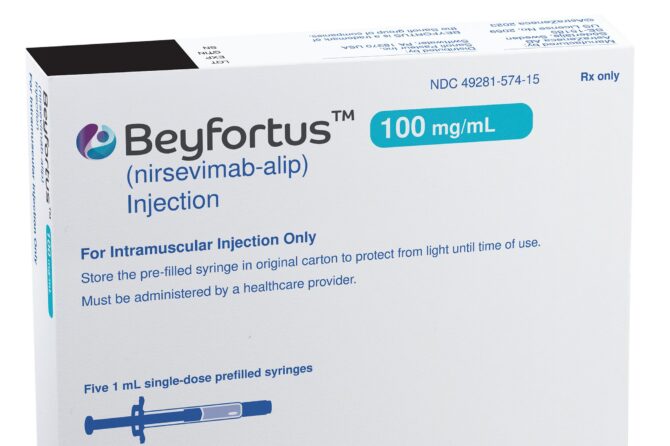
Nirsevimab (Beyfortus) – A preventative medication for RSV
By: Dr. Joseph Mechak
Over the past few weeks we gained a new tool to help prevent hospitalizations and deaths related to the Respiratory Syncytial Virus (RSV). Nirsevimab (Beyfortus) is a monoclonal antibody targeted against RSV that received both FDA approval and a CDC recommendation over the past few weeks. We are SO excited about this new drug. Here is what you need to know:
What is RSV?
The Respiratory Syncytial virus (RSV) is a mucous producing respiratory virus that infects the lower respiratory tract (lungs). In young children, it causes bronchiolitis which is hallmarked by copious nasal discharge, a junky cough, fever, and in some babies, respiratory distress. RSV can be particularly severe in children < 6 months old, those that were born premature, or who have underlying heart, lung, or neuromuscular disease. RSV is the leading cause of hospitalization and deaths in young babies, accounting for up to 80,000 hospitalizations and 100-300 infant deaths per year. In older children, the infection is much less severe, typically causing cold-like symptoms. RSV season is usually from December to March but this has been less predictable since the pandemic.
What is Nirsevimab (Beyfortus)?
Nirsevimab is a new, long lasting, monoclonal antibody against RSV. A monoclonal antibody is a protein that helps the body detect, locate and destroy a bacteria or virus – in this case, RSV. Antibodies are typically made by the body in response to a vaccination or natural infection. In this case, we are giving the RSV antibodies directly rather than having the body make its own. Nirsevimab is NOT a vaccine but provides protection in a similar way.
Who should get Nirsevimab?
The CDC recommendations for Nersevimab are as follows:
- A single dose should be given to ALL infants birth to 8 months old born during or entering their first RSV season.
- A second dose should be given to infants 8-19 months old entering their second RSV season who are at increased risk of serious illness from RSV, including:
- Children who required 28 days or more of supplemental oxygen after birth and who continue to require medical intervention (supplemental oxygen, chronic corticosteroid, or diuretic therapy).
- Children who are profoundly immunocompromised
We are still awaiting comments and recommendations from the American Academy of Pediatrics (AAP) but they were involved in the studies and review process and expect they will support the CDC recommendations.
When should my child get their dose of Nirsevimab?
The CDC recommends that children born during RSV seasons should receive their dose within the first week of life and that all children < 8 months should receive their dose prior to the start of RSV season – sometime between October at December.
Does it work?
Yes! Several studies have been recently published that show that Nirsevimab reduced medically significant RSV illness burden by 70-74% and RSV related hospitalizations by 78-83%!
Is it safe?
Yes! In the same studies, there were no serious adverse events reported in the medication group. The most common side effects were injection site reaction (0.3%) and rash (0.9%).
Can it be given with other vaccines?
Yes, Nirsevimab can be given with other vaccines. Clinical trials show no safety concerns or impact on the effectiveness of other vaccines when given with Nirsevimab.
Why wasn’t it recommended for older children?
RSV is most problematic for children less than 6-12 months old. In older children, RSV typically presents with cold-like symptoms and hospitalizations are very rare. The medication was not studied in older children and is not recommended for healthy children older than 8 months or children older than 19 months with certain medical conditions. We will not be administering Nirsevimab to children for whom it is not recommended by the CDC and/or American Academy of Pediatrics.
Is it covered by insurance?
We hope and expect so, but have not received any information about cost or coverage.
Will Potomac Pediatrics recommend and/or offer Nersevimab?
Yes! We agree with the CDC recommendations and plan to offer Nirsevimab at Potomac Pediatrics. Supply, logistics, and cost/coverage are still not clear for the upcoming season but we are working on it and will provide more information when available. We do not have any doses in the office at this time.
What if I have additional questions?
If you have questions or concerns specific to your child, please contact your child’s provider. We will also provide updates on the website as they are available!
For more information, please see the links below:











Most Commented